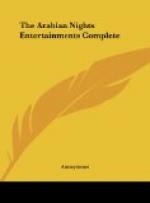“This writing is to testify, that Buddir ad Deen Houssun of Bussorah, has sold to Isaac the Jew, for the sum of one thousand sequins, received in hand, the lading of the first of his ships that shall arrive in this port.”
This note he delivered to the Jew, after having stamped it with his seal, and then took his leave of him.
While Isaac pursued his journey to the city, Buddir ad Deen made the best of his way to his father’s tomb. When he came to it, he prostrated himself to the ground, and, with his eyes full of tears, deplored his miserable condition. “Alas!” said he, “unfortunate Buddir ad Deen, what will become of thee? Whither canst thou fly for refuge against the unjust prince who persecutes thee? Was it not enough to be afflicted by the death of so dear a father? Must fortune needs add new misfortunes to just complaints?” He continued a long time in this posture, but at last rose up, and leaning his head upon his father’s tombstone, his sorrows returned more violently than before; so that he sighed and mourned, till, overcome with heaviness, he sunk upon the floor, and drops asleep.
He had not slept long, when a genie, who had retired to the cemetery during the day, and was intending, according to his custom, to range about the world at night, entered the sepulchre, and finding Buddir ad Deen lying on his back, was surprised at his beauty.
When the genie had attentively considered Buddir ad Deen Houssun, he said to himself, “To judge of this creature by his beauty, he would seem to be an angel of the terrestrial paradise, whom God has sent to put the world in a flame by his charms.” At last, after he had satisfied himself with looking at him, he tool; a flight into the air, where meeting by chance with a perie, they saluted one another; after which he said to her, “Pray descend with me into the cemetery, where I dwell, and I will shew you a beauty worthy your admiration.” The perie consented, and both descended in an instant; they came into the tomb. “Look,” said the genie, shewing her Buddir ad Deen Houssun, “did you ever see a youth more beautiful?”
The perie having attentively observed Buddir ad Deen, replied, “I must confess that he is a very handsome man, but I am just come from seeing an objets at Cairo, more admirable than this; and if you will hear me, I will relate her unhappy fate.” “You will very much oblige me,” answered the genie. “You must know then,” said the perie, “that the sultan of Egypt has a vizier, Shumse ad Deen Mahummud, who has a daughter most beautiful and accomplished. The sultan having heard of this young lady’s beauty, sent the other day for her father, and said, I understand you have a daughter to marry; I would have her for my bride: will not you consent?’ The vizier, who did not expect this proposal, was troubled, and instead of accepting it joyfully, which another in his place would certainly have done, he answered the sultan: May it please your majesty, I am not worthy of the




